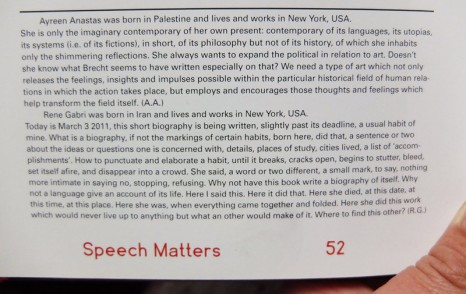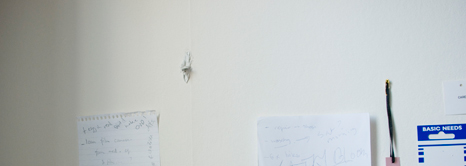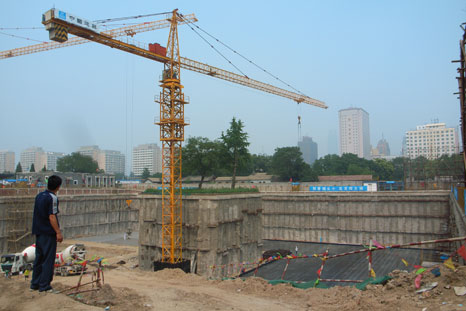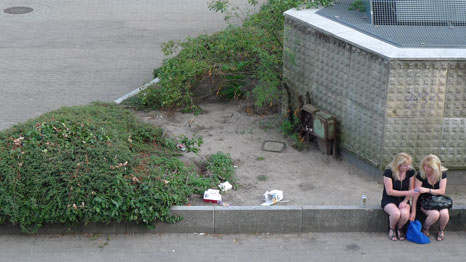“Visibility makes bare the conflictual nature of autonomy.”
“Visibility makes bare the conflictual nature of autonomy.”
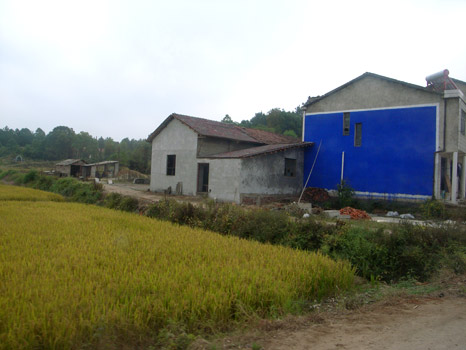

I don’t remember anymore exactly what context these words were written, random scribblings here and there, nowhere near as precise as her drawings, my notes having lost their specificity in time and space——depending upon one’s mood, everything can be about art or love or politics. The truth of that is an X-X-X, or “cha cha cha“, as she says, and even if i didn’t want to teach anybody anything, words fall out sloppily and ego still wishes for someone to pick them up.
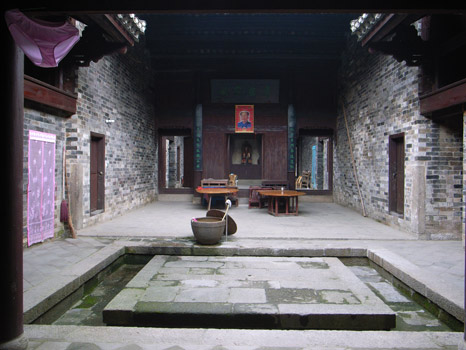



“Visibility makes bare the conflictual nature of autonomy.”
I write it down because i don’t know who you are, or perhaps that’s merely a reflection of how little i know myself. Our togetherness isn’t really about a specificity in time and space, so there was no need to ask for visibility in the first place; we could accept speed, the vaguenesses of motion, non-places and all that sort. And why, would that invisibility make us more connected in some way, as if we could melt into some general idea, the seamlessness of an a-history? “Let’s not leave any traces,” I remember thinking, but my, now isn’t that sloppy.


Autonomy was seldom and always the question. Even in art, love, politics and science, like cha cha cha, it was actually the struggle of a singularity, call it human, but this singularity was much more a plea, a collective bargain, only yeah, maybe without singular demand. To be seen is not the same as being heard, and if we tried merely to subsist, voiceless for centuries, would that mean we were toiling backwards, trapped or free? She said today, “It would be very difficult to leave, being born into this kind of life, and if we did, it would be very difficult to come back.” I thought of the freedom of precipices, another dramatic moment, that articulation such that we are changed yet again, forever. What does it mean to be heard?

Are we co-conspirators, simply because you see me; what makes this withness, and if love is the thing to turn anyone into people, what holds us together and must we stand apart from everyone else? There are wars in politics, disagreements in science, revolutions in art. But love is both an anyone and a people, constantly exchanging identities, on a precipice. I see you…
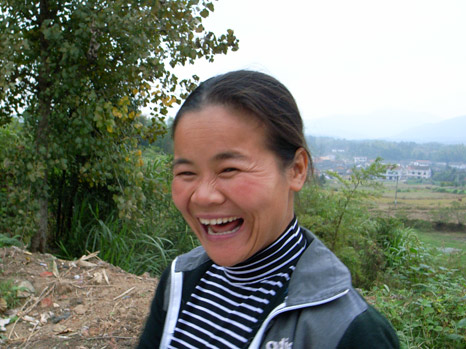 —all images taken Autumn 2011 from 张谷英 Zhangguying, Hunan Province
—all images taken Autumn 2011 from 张谷英 Zhangguying, Hunan Province
What can a phrase such as ‘natural course’ mean anymore in a time of such intense production?

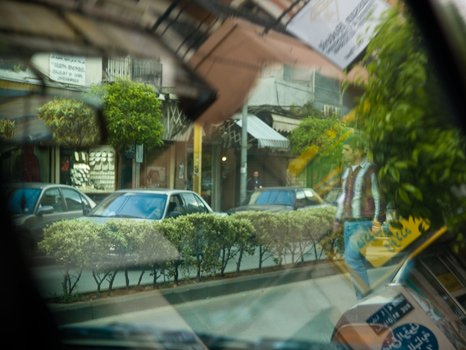
At one point during one of our discussions, Jad mentioned something about the need to build systems and structures so that we can break free from them. At the time i did not agree so much, perhaps out of mere exhaustion (the dialectic), and maybe also there has just always been some part of me that desires to find out how far we can just let things go, or to understand the limits of tolerance.
Phasing works in a similar way, though taking a walk in the city makes a clean set of variables into a dirty game. The phase is an easy, fun experiment; it breaks out of itself predictably but still fascinating to listen to — self-contained by reception. But it seems difficult to consider any form of reality anymore in terms of such structure; what is always lies next to and around itself, everything is multiple. Perhaps it’s simply a poor understanding of mathematics, but I never know how to discern exponentiality from noise. Circling now (the dialectic), it’s another form of fascination — like listening to sound upon sound. Or maybe it’s simply the idea of being attentive to the things that have always been there.
This is an audio recording combining several journeys traced from an original route shared by Maral Der Boghossian, who has visited her father’s shop in Bourj Hammoud two to three times a week for over 25 years. At the time of this writing, not a single participant after Maral has been able to successfully follow the audio to reach the shop, and this reveals certain weaknesses in the structure of the game, but I guess it’s also just letting things follow their natural course.
//
Participants in the recording: Maral Der Boghossian, Jad Baaklini, Paul Gorra, George Haddad, Christophe Katrib (accidentally powered off), Céline Khairallah, Lynn Kodeih, Fotini Lazaridou-Hatzigoga, Lina Sahab and the blacksmith around the corner from the tree that Maral’s grandmother planted some 40 years ago.

April 2011, Beirut
Posted by 丫 | more »the light of day: crossing and cutting
of crosses. crossing. an owl and a cross. a stranger crossing. a reflection crossing through an image. slightly like an orthodox cross. or it is what i want to see. there is a cross here now in my room. somehow it is always here and never there. here. in this room. this room. this. a resemblance crossing. it is silver. it is a gift. it is the cross of aksum. it is small. it is an afterthought. it is coarse. not delicate. it is a time of crossing and cutting. not delicate. where things are played out at night. the young grow old in a breath. you are who you’re not. blink. blink again. the dinner table. the skylight. the washing up. you. slightly above eye level on a lump of blue-tack on the wall behind this screen. (from the drafts folder, written as a reaction to this post and other things at the time, the cross is still here, but the room is different.) (we all have basic needs.)
Posted by a | reply »archival stuff: the elbows
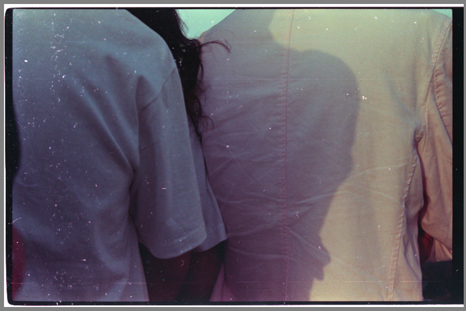
pending other posts, possible posts, about loss and grounding, and journeys, and drifting, always drifting, of course. an old image from the last days with the scanner at 12 warmington tower. i left london for beijing the day after. to return and to leave. a last one from this series before the year ends. this series that brought together and parted. a conversation with the silence of one. a silence that had started then and is still a silence today. before the year ends. the elbows. the scratches are from a long bout of forgetfulness resulting in negatives and prints being left at the konica place on dongsinandajie for nearly a year. upon returning i had still forgotten and was lucky that the staff had still remembered. scratches possibly from the tea flask of the guy with glasses, or a pair of scissors, an ice-cream wrapper, a pencil, the edge of the drawer, a quick doodle of a bunny rabbit, a paper clip, shopping or to do lists, an enlargement order, the order of a ballerina portrait to be printed on stone, slate stone, or bassie en adriaan or weiwei and her husband who also grace the interior of this store. not far from tiananmen. tiananmen. we spoke of tiananmen today. here. away. “yeah, you know that market, behind there, behind tiananmen square.” “i can’t remember the name.” “the wholesale one.” “no, not tianyi.” “just a second, let me ask.” ….”xidan.” “i went back in august this year and bought loads of things there.” “there was this handbag i bought and everyone here thought it must be over a 1000 dirhams or something but it was only 70 kuai.” we speak of inflation at the dinner table. the elbows. the elbows resting on the edge. the elbows of a you i have left. a you who was not there on this day. a you who’s elbows are in a far darker place than merely the shadow cast upon us by someone standing behind.
Posted by a | more »展览题为“如何独处” The Title of the Show is ‘How to Be Alone’
1// 《但愿我能为您描绘得更好》第二期里献给友子的歌: “菜单/那么今夜何处是京都/猫咪马琳”(演唱者:“声音向导”乐队,声音介入部分:何颖雅、何京蕴) From the publication iwishicoulddescribeittoyoubetter number two, for Tomoko: “Menu/So Where Is Kyoto Tonight?/Mullin The Mog” by DirectorSound with inserts by Elaine W. HO and Anouchka van DRIEL
2// “解手与生产”,尝试为高灵口头翻译Paul CHAN的文本 “Pee and Production”, trying to orally translate a text by Paul CHAN to GAO Ling
3// 爸爸骑着摩托, 儿子坐在后座上打着快板, 我们一起在儿童电影夜场喝了点酒,家作坊2010年 The boy comes home with his father playing kuaiban, we had been drinking at the kids’ movie night, HomeShop 2010
4// “你好呀,劳伦斯老师!” 这段对我外婆的采访录音是1991年我中学历史课上的家庭作业——“口述历史”,我妈妈也在“其间”。 “Hellll-o Mizz Lawrence!” An oral history project, my grandmother, mother and me, 1991
5// 五岁的我,在数数和唱歌 When I was 5 years old, counting and singing
6// 我在购买的迷你SD卡上找到了70多首歌,从中选了十首歌并通过数码处理,把它们的节拍统一成每分钟120拍(特殊感谢Ryan KING在数码处理) Music found on the micro-SD cards purchased to create this work, whereby among 70 songs in total ten were chosen and digitally synced at 120 beats per minute (processing courtesy of Ryan KING)
—–
装置在《第三房:如何独处》展览,站台中国,2010年11月11日-2011年1月24日
Installation part of The Third Party: How to Be Alone (or nowhere else am i safe from the question: why here?), on view at Platform China, 11 November 2010 – 24 January 2011
THE WORK (for 絵美 and a friend of hers, and for everyone amidst iwishicoulddescribeittoyoubetter)
How could this be institutionalised? In describing, putting the words to entities, in finding vocabularies and knowing where to look, we are trapped already. How couldn’t we be? Should I write such that you never understand; should I make work that never needs to be seen; should anything other than question marks arise?
Is this a work? Would we rather toss it all off to a little game, scoff at those who take themselves too seriously, never be so ridiculous as to consider the nests of “art” and “life”? Are the words one is using as important as the to whom one is speaking? “What is the work of man?” And why not say it, invest oneself with intention, make the attempt? Flail? This is not an institution, as could it ever be, with time, with the fulfillment of certain criteria of Work. We are tied to a production as always, since before we were aware of it, since we were animals. And the guillotined bumblebee, as Agamben asks, is he as busy as ever, do we continue amidst work, does time fly when…?
Should anything other than question marks arise?
What-is-the-work?
Should the work be defined by a trade, a certain amount of craftsmanship, the ergon of man, a list of projects and venues to which one must be flown? Does work define our activities or does activity define work? Why should vita contemplativa be placed above vita activa in a society with no God? Is this the captivation of the bumblebee, are we productive enough, should we make particular dialogues in work-group fashion? Because if I play, or if i dangerously mix words like “art” and “life”, like you know, when
Every afternoon he goes there to see a big painting for two hours, and he says, ‘I’m doing the work to see the work’. That’s ok, I think it’s no problem. He did another work where he pays for three months of traditional Chinese music lessons, on the erhu. – 马永峰 MA Yongfeng, Forget Art
Can a situation be Work? Our particular arrangement to one another, did you try that out, were you networking? Is the amount of control in any given situation a Work? Is control a result of the fact that there is no one around to help us, or that we are ‘mere’ fascists? Is the controlled situation a place of God or science or politics? Why do you question, why go beyond captivation? What did you question, what did you create, where did you control the situation and where was spontaneity a lie? 艾未未 AI Weiwei calls it the “vocabulary” that “can also be the total meaning of the concept”; Pierre Huyghe says a one:to:one ratio of idea:to:form. These are control experiments, perhaps, but not without the certain seepages that blur the distances between the Work and our ethics, our politics——our everyday. We take ourselves too seriously. In the fullness of the situation, yes. And yes, he is right, we could not presume it to be so before its occurrence, where there is thus the very small moment when the lack of control has perchance to touch upon the work’s going beyond itself. An eventfullness…
Have we said too much already? Really, should anything other than question marks arise?
Are these thinly veiled treatises, and what have you really got to say?
Stopping oneself… (slow, slow loading, please be patient)
Posted by 丫 | more »